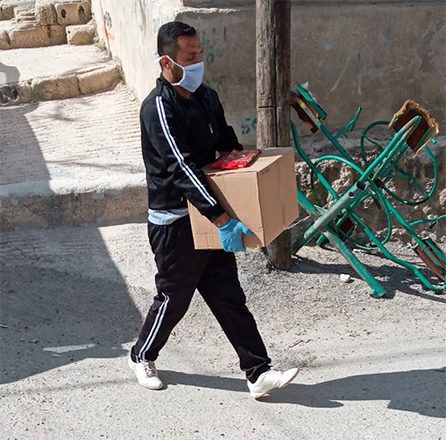You are here
ARDD holds first virtual regional dialogue on social protection policies in the Arab world
By Maria Weldali - Apr 14,2020 - Last updated at Apr 14,2020
AMMAN — The Arab Renaissance For Democracy And Development (ARDD) on Monday organised its first virtual regional dialogue on the subject of social protection policies in the Arab world, focusing on issues deemed to be the most pressing, which are presently linked to the novel coronavirus.
The dialogue which is the first of a series of dialogues, aims at bringing to light the recent efforts made by those concerned at the international, regional and national level, in addition to discussing the social challenges associated with the pandemic in the region and what are the lessons learned, according to organisers.
“The idea of convening these dialogue debates is to host a pool of experts in the Arab region, to discuss topical issues influencing the current situation,” the Chair of the Senate Labour And Development Committee Sawsan Majali, who is the dialogue sessions moderator said during the first session, which was hosted on the video conferencing platform Zoom and live-streamed on ARDD’s Facebook page.
The Minister of Social Development Basma Ishaqat said during the dialogue that Jordan’s Social Security Strategy, which was approved in June 2019, has three strategic themes that focus on improving the working environment and certain policies regarding social security along with providing financial aid to impoverished families, by having studies to determine the poverty rate.
“According to a recent study by the Department of General Statistics, the poverty rate in Jordan stands at 15.7 per cent, but there are many people living on the margins of the poverty threshold and any financial upheaval puts them in the poverty cycle,“ Ishaqat expressed.
A monthly recurring aid is provided to 105,000 families and two new phases have been added to the aid programme, which has resulted in helping 50,000 more families, the minister added, noting that during this unprecedented period e-wallets have been activated in cooperation with the Central Bank, so that beneficiaries could withdraw cash.
There is a detailed database with up-to-date information on the economic and social status as well as the precise circumstances of nearly 1.3 million families, she added.
“We use this data to determine which groups need further attention,” Ishaqat said.
The Ministry of Social Development takes an equity-focused approach with the aim to provide access to social security services, whether in the ministry’s social services which focus on persons with special needs, the elderly and vulnerable ones or other services in the health and educational sectors.
“The corona crisis has got us into this distress, which made us reconsider our priorities and plans, therefore the Prime Minister has established a social security committee,” Ishaqat said.
Former Minister of State for Economic Affairs Yusuf Mansour said that the coronavirus came at “an inappropriate time” given that Jordan has suffered from economic recession for ten years, adding that the Kingdom’s debt stands at 96 per cent and is expected to increase due to the outbreak.
“This pandemic knows no borders, and in order to contain it everyone’s cooperation is necessary,” Mansour said, noting that the on going crisis must be dealt with urgently by utilising unconventional economic tools.
The Kingdom’s revenues from customs have decreased significantly due to the contraction of the economy, noting that amid this pandemic all updates need to be “localised”, aiming at mitigating the outbreak’s negative impacts, Mansour added.
As for Akram Khalifa, the regional advisor on gender equality and women’s empowerment in the Economic and Social Commission for Western Asia (ESCWA), said that the region’s losses in light of the pandemic is estimated at no less than $22 billion.
Supporting Mansour’s opinion, Khalifa added that the current situation is new therefore all national efforts are trying to identify the nature of the pandemic.
“The outbreak will diminish middle-income classes, “ Khalifa expressed, adding that the projected increase in the numbers of the poor is 8.3 million, reaching 101.4 million in the region.
With the onset of the novel coronavirus crisis the League of Arab States (LAS) called for a meeting with the council of Arab health ministers, during which China’s precautionary measures were presented to order to benefit from their experiences in controlling the fast spreading virus, Haifa Abu Ghazaleh, assistant secretary general and head of the social affairs sector at LAS, said during the discussion.
Noha Mikawy, director of Ford Foundation in the Middle East and North Africa, said that the novel coronavirus is not the only thing to be blamed, since capitalism drove societies in to this situation.
“The Ford Foundation is not a booster programme for humanitarian relief, but supports long-term strategic thinking to address the structural systems which cause global crises,” Mikawy added.
Related Articles
AMMAN — The Arab Renaissance for Democracy and Development (ARDD) organisation held an online panel discussion on Tuesday, titled “The Impac
AMMAN — The Arab Renaissance for Democracy and Development (ARDD) has been providing support to over 16,000 vulnerable families from refugee
AMMAN — Around 350,000 families in Jordan have received financial and in-kind support during the curfew period, Minister of Social Developme












